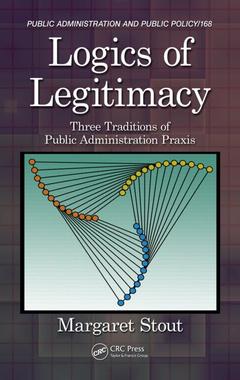Logics of Legitimacy Three Traditions of Public Administration Praxis Public Administration and Public Policy Series
Auteur : Stout Margaret

The discipline of public administration draws predominantly from political and organizational theory, but also from other social and behavioral sciences, philosophy, and even theology. This diversity results in conflicting prescriptions for the "proper" administrative role. So, how are those new to public administration to know which ideas are "legitimate"?
Rather than accepting conventional arguments for administrative legitimacy through delegated constitutional authority or expertise, Logics of Legitimacy: Three Traditions of Public Administration Praxis does not assume that any one approach to professionalism is accepted by all scholars, practitioners, citizens, or elected representatives. Instead, it offers a framework for public administration theory and practice that fully includes the citizen as a political actor alongside elected representatives and administrators. This framework:
- Considers both direct and representative forms of democracy
- Examines concepts from both political and organizational theory, addressing many of the key questions in public administration
- Examines past and present approaches to administration
- Presents a conceptual lens for understanding public administration theory and explaining different administrative roles and practices
The framework for public administration theory and practice is presented in three traditions of main prescriptions for practice: Constitutional (the bureaucrat), Discretionary (the entrepreneur), and Collaborative (the steward). This book is appropriate for use in graduate-level courses that explore the philosophical, historical, and intellectual foundations of public administration. Upon qualified course adoption, instructors will gain access to a course outline and corresponding lecture slides.
Why and How the Traditions Framework Was Created. The Legitimacy Question. Why Worry about Role Conceptualization? Professional Socialization in Public Administration. Using Theoretical Frameworks as Interpretive Lenses. How the Traditions Framework Was Created. The Traditions Framework. The Generic Elements of Each Tradition. The Constitutional Tradition—Bureaucratic Accountability to the Constitutional Order. The Discretionary Tradition—Entrepreneurial Responsibility for Desirable Outcomes. The Collaborative Tradition—Stewardship Responsiveness to the Citizenry. Critique and Analysis. Mutual Critiques among Traditions. Integrations, Conciliations, and Dialectical Syntheses. Assessing Contextual Fit of the Traditions—A Mental Experiment. Appendix: Foundations Course Outline.
Margaret Stout is an assistant professor of public administration at West Virginia University. Her research explores the role of public and nonprofit practitioners in achieving democratic social and economic justice with specific interests in administrative theory, public service leadership and ethics, and sustainable community development. She has a particularly strong interest in the ontological underpinnings of these issues. Her published work can be found in Administration & Society, Public Administration Review, Administrative Theory & Praxis, International Journal of Organization Theory and Behavior, Journal of Public Affairs Education, Public Administration and Management, Contemporary Justice Review, Encyclopedia of Public Administration and Public Policy, Second Edition, and PA Times. She serves on the board of the Public Administration Theory Network and is active in the American Society for Public Administration, serving as chair of the Section on Public Administration Education and on the board of the Section on Democracy and Social Justice. She also serves on the editorial board of Administrative Theory & Praxisand provides peer review for a host of other academic journals.
Dr. Stout’s first career was in human resource development, with a focus on work/life balance programming. Leading directly from related experiences in statewide and regional community and economic development initiatives, her second career was in community and youth development, serving as a community organizer, project manager, executive director, and organizational consultant to a host of nonprofit and government agencies in Arizona. She enjoys bringing these varied practitioner experiences into her current career as a professor.
Date de parution : 08-2012
Ouvrage de 232 p.
15.6x23.4 cm
Disponible chez l'éditeur (délai d'approvisionnement : 15 jours).
Prix indicatif 99,36 €
Ajouter au panierMots-clés :
Public Administration; Direct Democracy; governance; Postmodern Public Administration Theorists; government; Assumed Governance Context; Administrative legitimacy; Public Administration Theory; Collaborative Tradition; Public administration practice and praxis; Contemporary Governance Context; Administrative role and identity; Administrative Evil; Collaborative administration; Discretionary Tradition; MPA Program; Revolving Door Theories; Organizational Theory Framework; Public Service Motivation; Intentional Social Actors; Public Administrator Role; Policy Administration Dichotomy; Bureaucratic Organizing Style; Orion White; Good Life; Ideal Type Method; Constitutional Tradition; MPA Curriculum; Role Conception; Knowledge Acquisition; Neutral Competence



